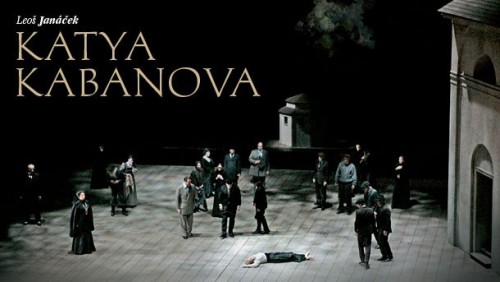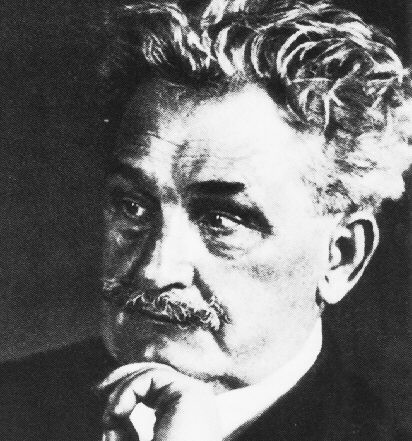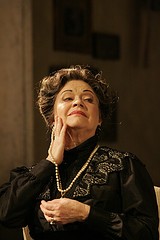Karita Mattila as Katya Kabanova at Chicago's Lyric Opera
Jonathan Miller Revives Production of Leos Janacek
By: Susan Hall - Nov 27, 2009
On November 25, Karita Mattila recreated one of her signature roles as Katya Kabanova at the Lyric Opera of Chicago. As we have come to expect from the Lyric, the production was flawless.
Janacek is recognized with Benjamin Britten as one of the two great operatic composers of the 20th century. It's daunting to think of him as an opera critic, but he was. When another critic attacked the first production of Katya, he remarked, "There is no bark of the German oak above Katya Kabanova, and the stage did not wreak of a Bavarian brewery. No, the softness, the lyricism of the work with its dramatic accents which stopped the beating of one's heart have been saved. And the secret smell of the meadows abounding with flowers, the quiet yearning and the lament of the broad Volga (an offstage chorus) these were early conjured up on the wide stage."
On the one hand, Janacek did not consider himself part of the operatic tradition, and on the other, he was always first out to hear and see any new productions. Recognizing no one, he learned from everyone.
Much has been made of his passionate love for a young married woman he met four years before he composed Katya. Almost 700 letters he wrote to Kamila Stosslova expressed his joys, longings, fears and despairs. Whether she ever wrote back isn't known, although she may have asked Janacek to burn the replies. Even if all of this passion was a one way street, future music lovers benefited from the extraordinary production it inspired in the last eleven years of Janacek's life, ending with the not completed opera, From the House of the Dead. Which is currently in production at the Metropolitan Opera Company in New York.
Janacek wrote to Kamila as he composed Katya, "Madam, when in 1915 I saw your tears -- the child in your arms, your husband at the front, your grief, your suffering, your despair, poured into my vision of Kat'a Kabanova. Does the yearning, the sorrow you have awakened in me, does it not lie in this melody?" Enough said.
Janacek also looked to Russia and the East instead of Vienna and Germany for his inspiration. He loved Tchaikovsky and was grieved when he had to leave the Kremlin – "a fairy tale, so intimate and endearing…from here Moscow is a sea of towers...my beloved Russia."
Whatever led him to the play of Alexander Ostrovsky on which Katya is based, is mirrored his own interest in the countryside of his youth. He loved the upper reaches of the Volga, where the melody and the imagery of the local dialect moved him, as did the beauty of the people and their traditions. Like Ostrovsky, he was concerned about the oppression of small town society.
Katya is often referred to as a Madame Bovary, or Madama Butterfly, an innocent overwhelmed by passion. I find the madness of Ophelia in her as well. The challenges Janacek wrote into her music, which has some very difficult high notes, were all met by today's foremost Katya, the Finnish soprano, Karita Mattila.
Mattila, in glorious voice was often hypnotic. Her bright, soaring soprano triumphed over the challenges. Her emotional presence sometimes feels flat. Critics focused on the direction of the seriously flawed Tosca at the Metropolitan Opera earlier this fall. Part of the fault, however, surely lay with Mattila's lack of dramatic arc as Tosca.
Some audience members at the Lyric commented that they were put off by her gestures. I found them interesting, because they were directed to accompany the musical line. This may be too intellectual an interpretation. The plot line is so condensed, if you are unwilling to suspect disbelief, that the onslaught of high emotion may happen too quickly. There is the jump from a first-sighted passion to overwhelming guilt for the forbidden love of someone other than a husband.
If the emotional condensation sometimes feels like a cartoon, its depth of feeling corrects. Janacek wrote: "Our gate will always remain open in art: the gate of emotion. On the whirlwind of emotion the development of music runs boldly forward."
The Lyric has lavished attention on selecting the right talent. Every cast member gave a noted performance, but it was the American tenor, Brandon Jovanovich, singing Boris who struck a high note. He likes singing in Czech, a language with more open vowels than French or German. His role reminds him of Pinkerton in Butterfly, "a man who is oblivious to what's going on around him." Jovanovich's matinee idol good looks make him easy to cast in great romantic roles, but this should not distract from a voice, the range and tones of which, reveal strong lyricism punctuated by an exciting edge.
Judith Forst has made the tyrannical matriarch Kabanisha a signature role. It was fun to see her literally lift her skirt when a groveling, rich merchant in town tried to get underneath. The curtain fell before we could see what happened next!
This production was developed by a series of general managers who preceded Joseph Volpe at the Metropolitan Opera in New York. Today's team at the Met could take a page from the Lyric's revival, where a star director, Jonathan Miller, provides spare direction, which does not call attention to his genius. Stage business never takes over the music or the voices. Designer Robert Israel matches the directorial style with an appropriately economical design; prim, stiflingly provincial, and yet, almost mythic in effect. Katya's watery end in the Volga was a vast improvement over Mattila's plunge from a tower in Tosca. The dummy replacing her got caught mid-flight.
The Volga River is a character in the opera, and is introduced in the orchestra as dark, brooding strings before the curtain rises. Followed by an eight note knock on the timpani, which repeats throughout the opera, we know that Katya's destiny is fixed from the start. The conductor Markus Stenz, making his Lyric debut, said, "It is hard to think of a more opulent score in JanacekÂ…It is mesmerizing to hear the orchestra display the full splendor of Katya's inner life and the subjects of everything happening on stage." Janacek radically adapted vocal lines to the Czech language and used lush orchestral music to convey the story in the pit as well as on the stage.
The secretary of the conservatory in Janacek's home town, Brno, could hear Janacek working on his piano from his open window. "Janacek kept banging on a few notes of the opening theme as loudly as possibleÂ…He repeated it many times unchanged. The verve of the playing made me realize how much he was carried away by the emotions of the motifÂ…This clearly was not composingÂ…He wanted to get himself into a certain mood to throw himself into the composition."
Janacek captures the basic substance of imaginative story telling (and surely opera falls into this category), composing not for reason but emotion.
The critic Janacek would have liked this production, a must see. Future performance dates are November 28, December 1, 4, 7 and 12 at 7:30 pm.






